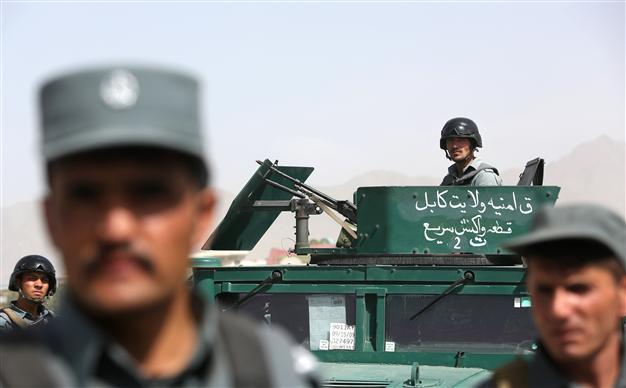Kabul plans detailed Taliban talks on ending bloodshed
KABUL - Agence France-Presse

Afghan security forces inspect the site of a suicide attack after clashes with Taliban fighters at the gate of an intelligence facility in Kabul, Afghanistan, Tuesday, July 7, 2015. AP Photo
Afghan negotiators said July 9 their next round of talks with the Taliban would focus in detail on ways to end bloodshed in the country, wracked by nearly 40 years of war.
Government representatives struck a positive note after returning from their first face-to-face talks with militant commanders held on July 7 in Pakistan aimed at ending the Taliban's 13-year insurgency.
The nascent talks have brought no let up in the Taliban's summer offensive, as the militants launched two suicide attacks in Kabul just hours before the July 7 meeting in Murree, a hill station north of Islamabad.
The session, which lasted through the night, concluded with an agreement to meet again after the Muslim festival of Eid, due to start around July 18, and government negotiator Din Mohammad said the aim was for more substantive talks on ending the fighting.
"In that meeting, a detailed discussion will be focused on preventing bloodshed in Afghanistan," he told reporters in Kabul.
Several informal meetings have been held in recent months between Taliban representatives and Afghan officials and activists, but the July 7 meeting is seen as a step forward.
The Afghan High Peace Council (HPC) delegation was led by Deputy Foreign Minister Hekmat Khalil Karzai -- the first time such a senior government figure has publicly met the militants.
Mohammad said the meeting also included a member of the Haqqani network, a hardline militant group blamed for some of the deadliest and most audacious attacks in Afghanistan in recent years.
"It is not easy to begin negotiations at any point, both sides have their own demands, but since it was the first official meeting, we consider it a positive step forward," Mohammad said.
In the past the Taliban have laid down tough conditions for talks, including the complete withdrawal of foreign troops.
Karzai said the militants' negotiators raised the troop issue on July 7, as well as the question of Taliban prisoners and the blacklisting of their leadership by the United Nations.
Divisions within the Taliban movement, particularly between young battle commanders in Afghanistan and older leadership figures abroad, have helped to hamper peace efforts over the years.
The extent to which the talks process will be respected by disparate factions remains unclear, but Karzai insisted the people they met had the support and permission of the Taliban leadership, who are believed to be based in the southwestern Pakistani city of Quetta.
"The people we met did have permission from the Taliban leadership and were representing Quetta shura," Karzai said.
NATO ended its combat mission at the end of December, leaving Afghan forces to battle the resurgent Taliban on their own.
Stretched on multiple fronts and facing record casualties, Afghan forces are struggling to rein in the militants, and there are persistent fears that the Islamic State of Iraq and the Levant (ISIL) is growing in influence in the country's restive southeast.
